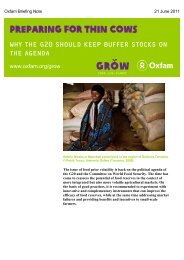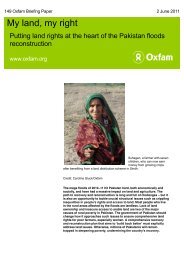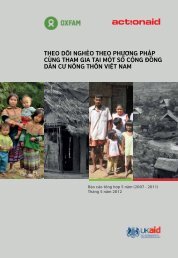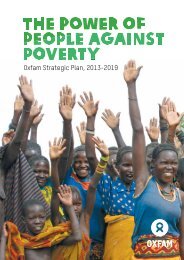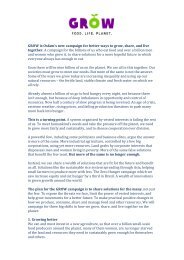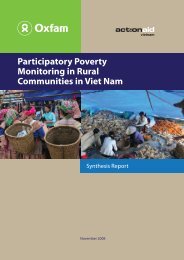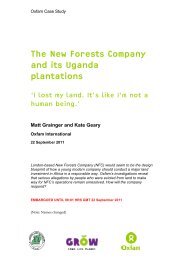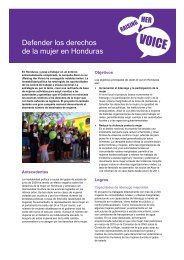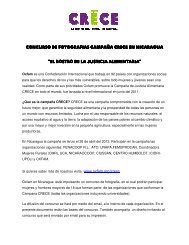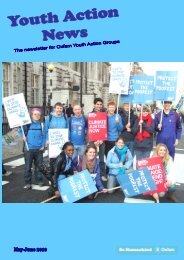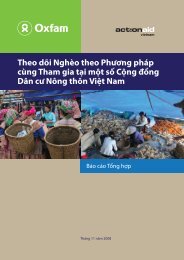Untitled - Oxfam Blogs
Untitled - Oxfam Blogs
Untitled - Oxfam Blogs
Create successful ePaper yourself
Turn your PDF publications into a flip-book with our unique Google optimized e-Paper software.
Rising Prices,<br />
Poverty Reduction and<br />
Relevant Policies<br />
Therefore it is necessary to change the way social benefits are delivered to the really poor.<br />
Of the 153 households in Tiên Cm 1 hamlet, An Thái commune, An Lao district, Hai Phong, 18 are poor.<br />
Forty percent of these poor households are of the “202” group 26 including single, elderly, disabled and sick<br />
people who are not able to work. The remaining 60 percent of households can still work, although they<br />
rely on unstable incomes. Grassroots cadres suggest two different approaches to these two groups. The<br />
“202” group need national assistance (as resources are not available at the village/commune level). The<br />
second group requires capital and jobs in line with their own circumstances.<br />
Once the poverty line has been revised, in addition to overall pro-poor and social security policies there need<br />
to be policies dedicated to the poorest group to help sustain their livelihoods. Current economic difficulties<br />
provides an opportunity to review the classification of poor households in order to develop policies<br />
appropriate to each of the different groups. Those who are still able to work should be supported with<br />
credit, knowledge and jobs. Those who are not should receive assistance from grassroots mass<br />
organizations and governments (community-based assistance) as well as social benefits provided by the<br />
national government.<br />
5.2.2 Social protection policies<br />
The minimum wage paid by domestic enterprises and agencies is considered low (600,000 VND/month<br />
in Hanoi and HCMC, 580,000 VND/month in developed cities, districts and townships and 540,000<br />
VND/month in other places) given increasing prices, although the minimum wage was last revised in early<br />
2008. The minimum wage serves as the basis to adjust salaries, pensions, severance payments and other<br />
social benefits. The Government has committed to revise the assistance level for health insurance for the<br />
poor and near-poor in accordance with adjustments to the minimum wage level. Revision of the domestic<br />
minimum wage in line with foreign enterprises and institutions working in Viet Nam is in the spirit of the<br />
Enterprise Law and WTO commitments.<br />
The current level of social benefits for target groups (orphans, people over 85, disabled people, people<br />
with mental problems or HIV/AIDS, single parents with small children) as per Decree 67/CP dated April 13,<br />
2007 is very low (only 120 thousand VND/month). According to Article 7 of Decree 67, “as the minimum<br />
living standard of the people changes the norms for social benefits shall be adjusted accordingly”. It is<br />
therefore of great urgency to increase the minimum wage and social benefits to reflect the inflation rate and<br />
actual expenditures on basic food and non-food needs of low-income groups and social assistance<br />
recipients.<br />
Decree 67 does not cover the near-poor. Once the poverty line has been revised they will be entitled to social<br />
benefits provided by the national government. The current minimum assistance level for social assistance<br />
recipients (120,000 VND/month) is only equal to a little more than 20 percent of the minimum wage level<br />
currently paid by enterprises (540 thousand VND/month). According to grassroots cadres, it should be<br />
raised to at least 200,000 VND. In addition, there should be an increase of meal allowances and other<br />
benefits for local social protection centres.<br />
Decree 67/CP dated April 13, 2007 increases the assistance level and scope of social protection and,<br />
on the other hand, narrows the coverage by requiring poor household status. This has caused<br />
difficulties in implementation as many former social assistance recipients are disqualified because they<br />
are not from poor households. Both Hai Phong and HCMC, however, have been flexible in<br />
implementing the Decree.<br />
• Hai Phong: According to DOLISA, more than 4,000 (out of a total of 16,000) former social assistance<br />
recipients no longer qualify as per Decree 67. In Le Chan district alone 480 of the previous 700 still<br />
qualify. DOLISA has proposed to the Municipal People’s Committee to provide temporary assistance of<br />
120,000 VND/month until the next survey of poor households at the end of 2008.<br />
• Go Vap district: has also been flexible in implementation of Decree 67 by including an additional<br />
600 recipients who do not have poor household status. In response to the increased cost of living<br />
26 These social assistance recipients are often refered to as the “202” group as they are recognized under Circular 202-CP on « Policies on elderly people, orphans<br />
and disabled people » issued by the Government 40 years ago (on November 26, 1966). Viet Nam’s social protection policies have been revised and amended<br />
many times. The latest revisions are reflected in Decree 67/CP dated April 13, 2007.<br />
71



